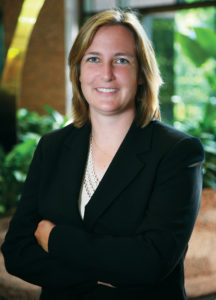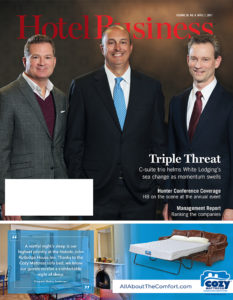 Julie Richter, CFO at Concord Hospitality Enterprises Company, has shaped the outcome of many transactions over the course of 10 years. Hired on as VP of finance at the Raleigh, NC-based hotel development, ownership and management company, she rose through the ranks, ultimately landing a spot in the C-suite.
Julie Richter, CFO at Concord Hospitality Enterprises Company, has shaped the outcome of many transactions over the course of 10 years. Hired on as VP of finance at the Raleigh, NC-based hotel development, ownership and management company, she rose through the ranks, ultimately landing a spot in the C-suite.
Prior to Concord Hospitality, Richter was VP and controller of Boykin Lodging Company, a publicly traded hospitality REIT. She began her financial career as an audit manager with Arthur Andersen LLP, a Chicago-based American holding company.
Hotel Business spoke with Richter to gather her thoughts on the art of negotiation and inquire about her definition of success, both inside and outside of the workplace.
Do you remember your first big negotiation? What about it thrilled you the most, and what did you learn from the process? I don’t recall any particular negotiation as the first. My involvement in our transactions has grown over time. Honestly, there is something to learn from each negotiation—whether it is a new perspective from which to view things or a rabbit hole you learn not to go down. It’s always satisfying to come to an agreement with a new business partner, and hopefully in the process, you were able to build mutual respect versus have it be something that is adversarial.
You’ve been with Concord for nearly 10 years. Did the CFO position always appeal to you, or did you just happen to fall into it? When I came to Concord, the CFO position did not exist, although it had existed at some point in the history of the company. I was brought on as the VP of finance, which was a change from my previous role as a controller. CFO became a natural progression of the finance role. I enjoy it much more than I enjoyed accounting work, although that part of my career (and starting out as an auditor) was a terrific foundation for my progression.
What’s the most challenging aspect of your job? Is it something you’ll ever learn to perfect, or is it an ongoing learning process? The most challenging aspect of my job, and of so many roles today—particularly in a company that is growing like ours—is balancing the multiple directions that we are pulled in on a daily basis. Sometimes, the squeaky wheel gets the grease, but it isn’t necessarily the most important thing that needs time and energy in a day in order to execute on strategy. Certainly, managing those competing things is an ongoing focus and learning process.
What’s a responsibility of yours at Concord traditionally not falling under the position of CFO? How did it become your responsibility? I probably have much less involvement in accounting and treasury functions than many CFOs, and more involvement in buying and selling things than many have. For many years, we ran without in-house counsel, and so I managed the legal aspect of things in partnership with great outside counsel, as well as focusing on the capital stack. The position evolved to where there was a need over time and away from things where there was already strong talent in place.
During your time at Concord, you helped develop more than $2.5 billion in projects. Without giving too much away, what’s your secret sauce? Quality and integrity, of course. We build great hotels in great locations with great partners. Each of us is charged with following our company’s cornerstones and forging lasting relationships that result in mutual benefit and ultimately growth for our company.
Working with investors over the years, how have their concerns changed? How have you evolved to address those concerns? I don’t know that I would say our investors’ concerns have really changed over the years. They all want to be a part of a successful project with partners whom they trust. But, we have seen some shift in the investor base, both geographically and generationally. From one generation to the next, the focus can differ from annual payouts to overall wealth accumulation.
What was the largest deal you pulled together at Concord and how did you pull it off? We’ve put together some pretty complex deals, some that seemed like they would never cross the finish line. It has to be a pretty special deal to merit the level of brain damage that some things have taken. (Brain damage can be directly correlated to the number of outside consultants it takes to get it done.) But for the right location with the right partners, it really is all worthwhile.
As a C-suite exec, how do you balance personal and professional life? I think if you ask the people around me about how I balance, their answers will vary depending on the day. Naturally, the tendency is to say that there isn’t enough time for the personal side of things and determining what the right balance is becomes a fairly complex formula (or I like to think so since I don’t think I have figured it out). In some ways, the further I go up the ladder, the easier it is to balance because I’m not afraid to insist on certain things that I may not have early on. And, the older I get, the more I realize that my actions on a given day won’t make or break the business. It’s OK to take some time. The real key to making it all work is to have a family that understands what I do and who I am and are supportive of the long-term goals.
If I asked someone you conducted a deal with about their experience with you, what would you hope they’d say? Hopefully, they would say that I strive to understand their goals and work to come to a reasonable result in a partner-centric way.
Lastly, how do you define success? Some days, success means making the last push so that we can ring the transaction bell. Other days, it just means having the right answer for someone with a question. On the best days, it means making a positive difference in someone’s life. But you really have to slow down and take notice to get to have one of those. HB

